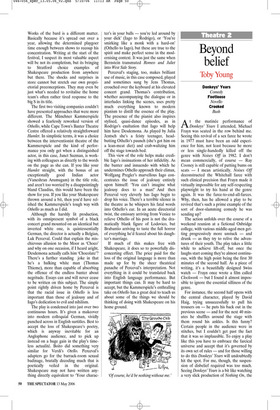Beyond belief
Toby Young
Donkeys’ Years Comedy Footloose Novello Crooked Bush
At the matinée performance of Donkeys’ Years I attended, Michael Frayn was seated in the row behind me. Seeing this revival of a sex farce he wrote in 1977 must have been an odd experience for him, not least because he more or less single-handedly killed off the genre with Noises Off in 1982. I don’t mean commercially, of course — Ray Cooney is still capable of putting bums on seats — I mean artistically. Noises Off deconstructed the Whitehall farce with such clinical precision that Frayn made it virtually impossible for any self-respecting playwright to try his hand at the genre again. It was the farce-to-end-all-farces. Why, then, has he allowed a play to be revived that’s such a prime example of the sort of door-slamming comedy he was sending up?
The action unfolds over the course of a weekend reunion at a fictional Oxbridge college, with various middle-aged men getting progressively more unstuck — and drunk — as they try to relive the adventures of their youth. The play takes a little while to achieve lift-off, but once the laughs start coming they’re almost continuous, with the high point being the first 30 minutes of the second half. As a piece of writing, it’s a beautifully designed Swiss watch — Frayn once wrote a film called Clockwork — but I found it almost impossible to ignore the essential silliness of the genre.
For instance, the second half opens with the central character, played by David Haig, trying unsuccessfully to pull his trousers on — he puts his back out in the previous scene — and for the next 40 minutes he shuffles around the stage with them round his ankles. Is this funny? Certain people in the audience were in stitches, but I couldn’t get past the fact that it was so implausible. To enjoy a play like this you have to embrace the farcical universe and accept that it’s governed by its own set of rules — and for those willing to do this Donkeys’ Years will undoubtedly hit the spot. For me, though, the suspension of disbelief required was too much. Seeing Donkeys’ Years is a bit like watching a very slick production of Nothing On, the play-within-a-play in Noises Off. As a classic British farce, it works very well, but I couldn’t help feeling that Frayn was right when, 24 years ago, he wrote the genre’s obituary.
Footloose, too, stretches an audience’s credulity to breaking point. As those who’ve seen the film will remember, the story revolves around the efforts of a teenage rebel, newly arrived from Chicago, to persuade the ruling clique of a small Midwestern town to lift its ban on dancing. Now when I saw the film in 1984, I remember thinking that no small American town, however conservative, could possibly hope to enforce an edict like that, so I was curious as to how a musical adaptation of the same story 22 years later would handle this problem. Would the action now take place in Tehran?
At first, I thought that the director, Karen Bruce, had cleverly decided to set the musical in the year the film came out, so that at least the plot would be no more implausible than it was in 1984. But after about 15 minutes it began to dawn on me that the outfits the cast was wearing weren’t intended to be a throwback to the 1980s — this was just the costume designer’s view of how young people dress today.
Then a second thought occurred to me. Perhaps Dean Pitchford — the man who wrote both the movie and the musical never intended the dancing ban to be taken at face value. Maybe Footloose is an allegory about homosexuality. It’s not really a story about a young man getting a redneck town council to take a more enlightened attitude towards dancing. It’s about a gay man persuading a group of conservative churchgoers that homosexuality isn’t a sin. In this light, the stage adaptation of Footloose forms part of a long and distinguished tradition in musical theatre in which the subject of homosexuality is addressed indirectly. Or, at least, it would if my theory is correct — which it almost certainly isn’t.
Like Footloose, Crooked is set in a small American town, though it has no qualms about dealing with homosexuality — and a number of other controversial subjects head-on. The central character is a precocious 14-year-old girl and the play charts her relationship with the 16-year-old daughter of a local Baptist minister. The preacher’s daughter is grotesquely overweight, as well as educationally subnormal, and I braced myself for a sneering attack on Christian Fundamentalism. Happily, Crooked never descends to that level and, in fact, the friendship between the two teenage girls is just a device for triggering a crisis in the relationship between the 14year-old and her mother. Crooked is a little underpowered, but it does have one great virtue: it’s short. As one of my fellow critics said to me as the curtain went up, ‘Four of the most reassuring words in the English language: 90 minutes no interval.’











































































 Previous page
Previous page